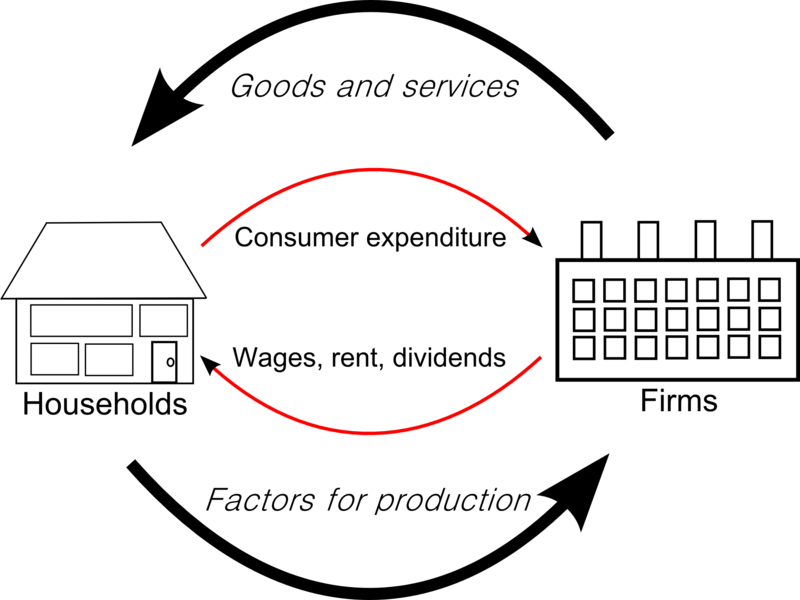Who’s the real villain?
Keith Ng writes today that the real villain in climate change is not businesses, it’s households! He claims that most growth in emissions and energy consumption is due to household consumption, not businesses. Which is the biggest red herring I’ve seen around climate change in a while.
Here’s a picture that will help: it shows how everything in the economy is actually linked together so considering household and business emissions separately makes no sense.

Now that may be a little simplistic but it’s good enough for our purposes here. Household emissions are measured by looking at the emissions generated in the production of goods that the household consumes. So the emissions come from producers, but the final product is consumed by households. Households provide the demand that causes the creation of goods that generate emissions in their production. So households are really responsible for ALL emissions. All emissions??? Yes, ALL of them.
What about businesses emissions? Well, businesses use goods to enable the production of other goods that households end up consuming. If there were no households buying things then there’d be no businesses making things. So this whole distinction between households’ and businesses’ emissions is really rather confusing, and more of a statistical device than a real division: one would not exist without the other.
Which brings us to the question of what you do about all these emissions from households. If we tax businesses then aren’t households getting off scot free? Absolutely not. Taxing businesses means that goods cost more to produce and, thus, cost more to purchase. Prices rise for household purchases and households decrease their consumption of carbon intensive goods. So we can actually decrease households’ carbon intensiveness by taxing the businesses alone. In fact, it the end it doesn’t really matter who you tax, the reduction in household consumption will be the same.
Not only that, but business income is what pays households’ salaries. So when businesses are taxed, and sell less, and make less money, household incomes go down. And they buy less, which reduces emissions, too.
The point is that you can’t consider household and business emissions as separate problems. They’re interlinked by the flow of goods and income in the economy. Solve one’s carbon externality problem and you solve both.

That is one of the concerns of the proposed cap-and-trade legislation. If the government puts to much financial pressure on businesses, it will be passed directly to the comsumer in the form of lower wages and higher prices.
Considering the current state of the economy, this may not be the wisest thing to do at this time.
My point in the article was that most of the emission growth has been in household primary energy consumption (i.e. Cars); that sending price signals to households is popularly framed as hurting households, when in fact households have done the least to improve their energy intensity (of sorts, since households don’t have “energy intensity” per se) and they really need that kick up the backside.
Of course you can introduce the cost at different parts of the production chain, and it’ll eventually come out of households’ pocket – and I wasn’t suggesting that the price signal come directly out of households.
But I don’t think it’s true that, for any product, introducing the cost at any point will have the same effect. When we talk about whether households should be shielded from the cost of climate change, we’re talking about products that’re most energy intensive (i.e. Direct energy consumption), because petrol/electricity prices are more transparent and easily quantifiable than, say, the carbon price that goes into making a block of cheese.
Transparency might not matter to omniscient rational economic agents, but for the rest of us, it makes price changes more salient, leads to loss aversion behaviour, sets off “this is a vice” cues, and so forth.
I was listening to a radio program this week (sorry I don’t remember which show or who the guest was!) but they were saying that the resources exist to access clean energy which would not require households to make any lifestyle changes. The guest emphasized that there is plenty of energy to go around. The problem is that “big oil” and its money are in control of everything and it doesn’t benefit them to have things any other way.
I’m not suggesting that individuals should have license to be irresponsible. I do a lot in my daily life to reduce my own energy consumption, but on the whole it is very difficult to get people to make lifestyle changes and there are many people who don’t even believe that climate change exists. They actually believe that it is a total myth. Looking to households and individuals for help with this global problem is a major uphill battle.
Hey, comment spam is getting really clever lately.
I mean its actually specific to the topic post! (i.e. from “Automatic Driveway Gates, Fishing Organisation and Jeans .. lol)